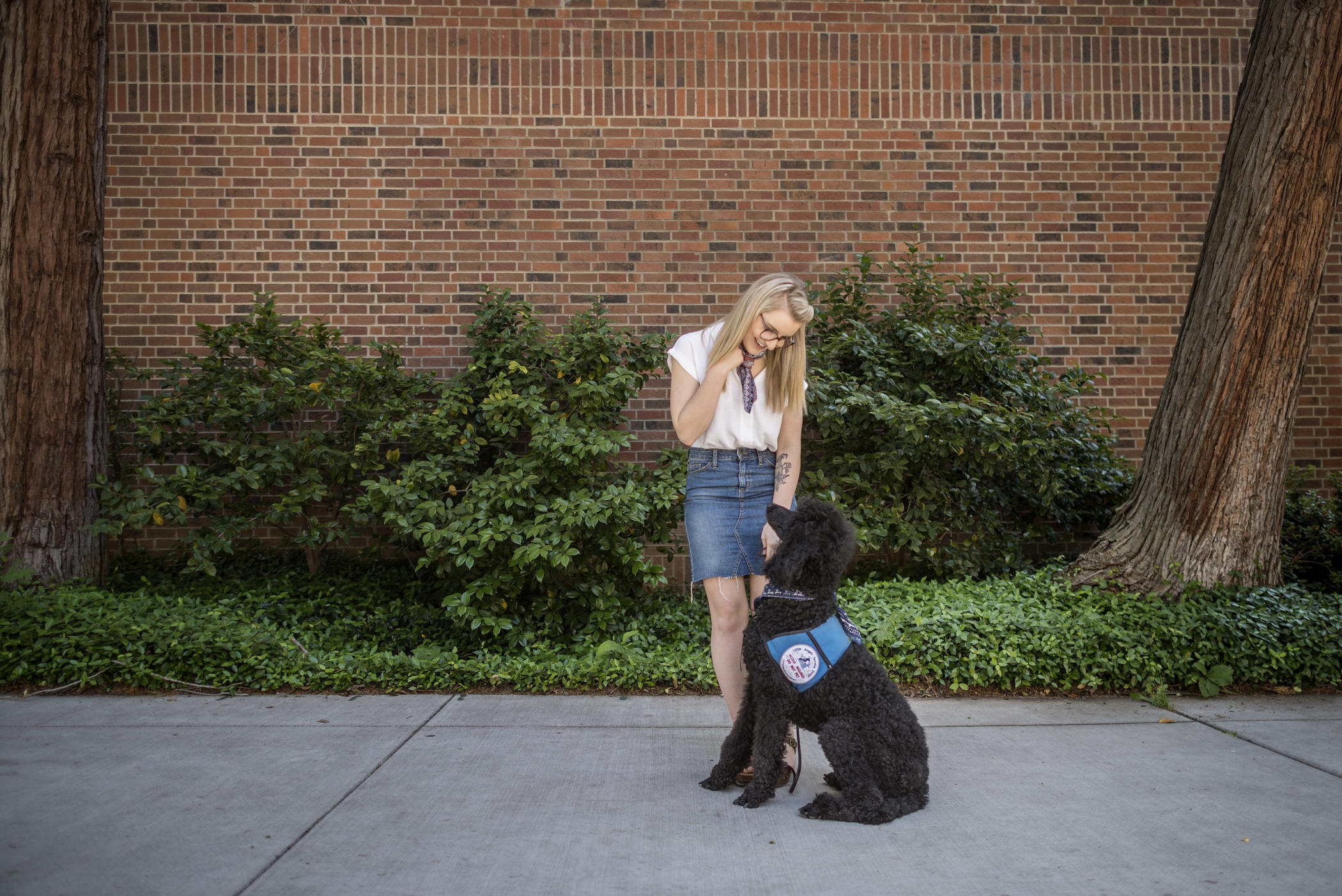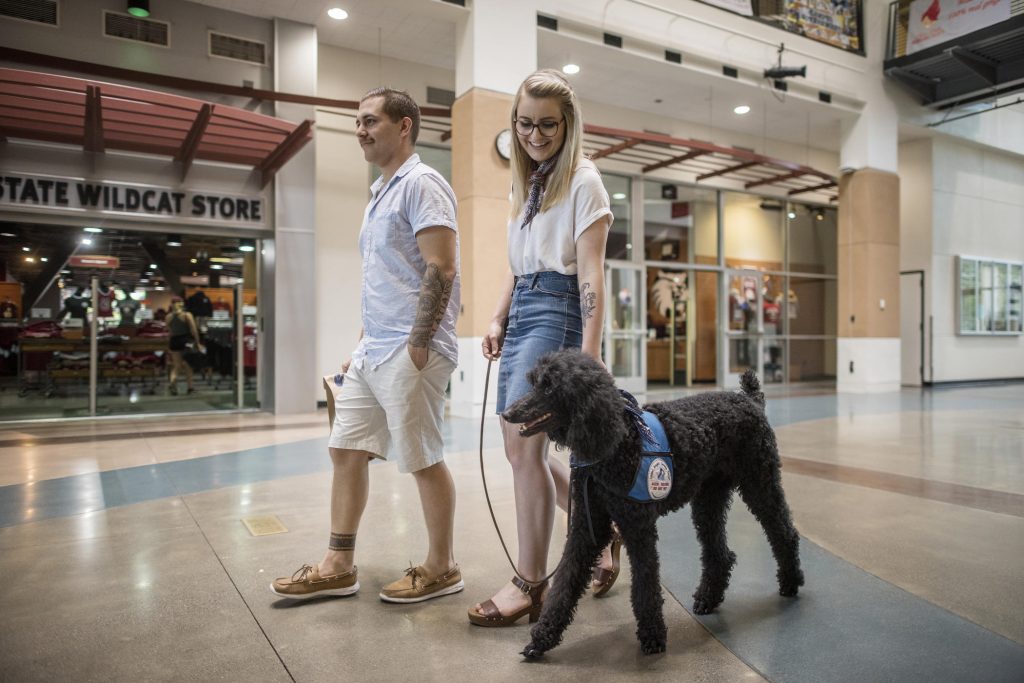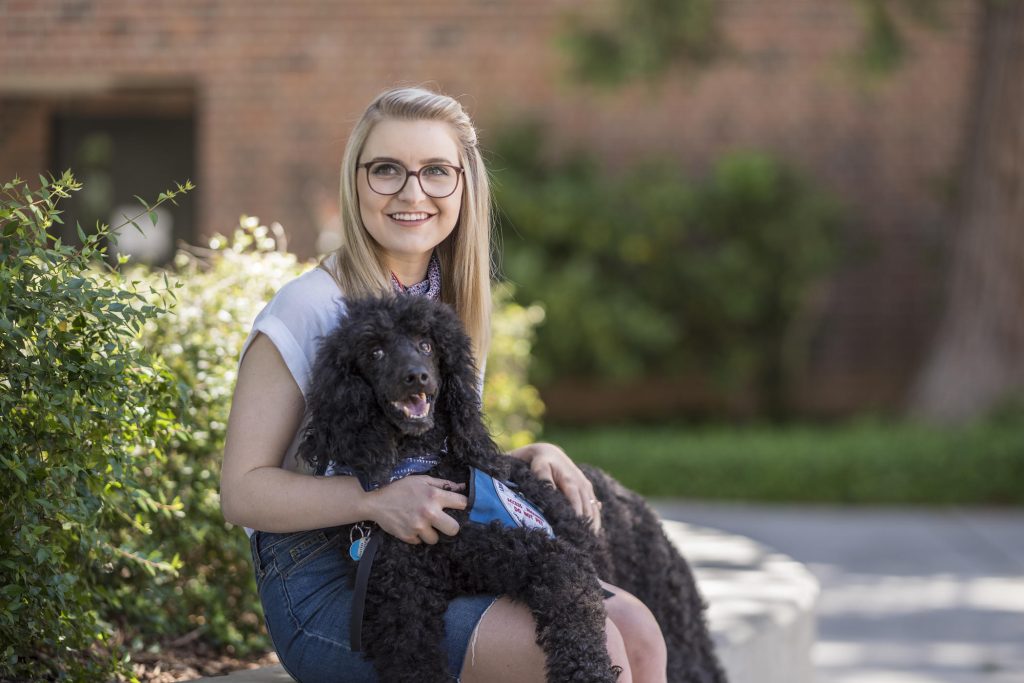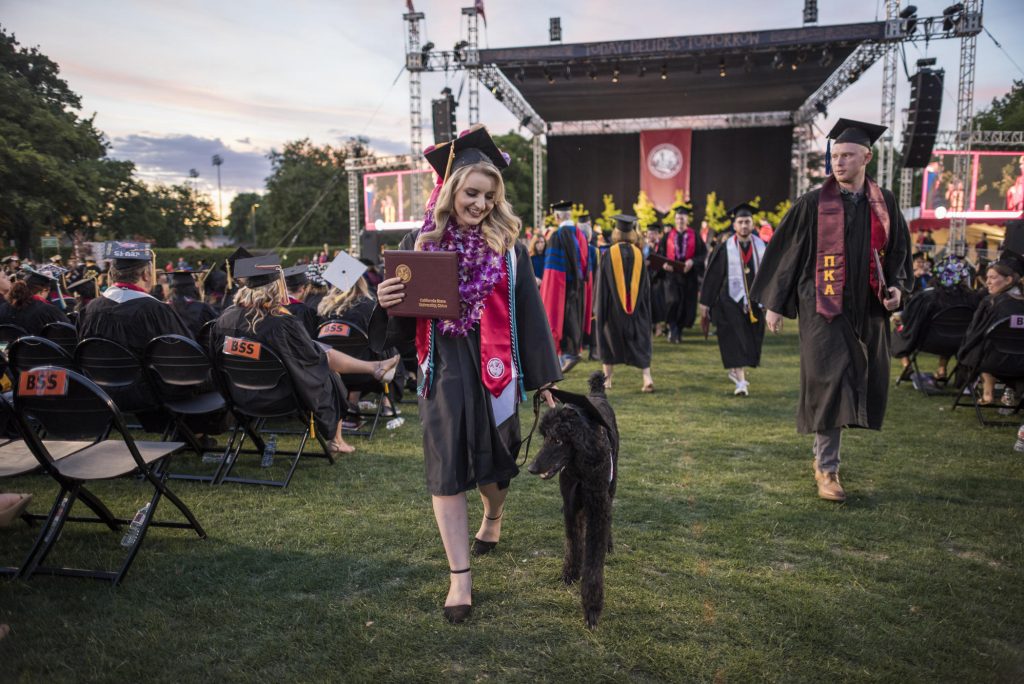Distance Learning and Davy Help Sociology Grad Fulfill Dream

Graduating distance student Taylor Coutts arrives of the first time to visit campus with her service dog Davy on Monday, May 14, 2018 in Chico, Calif. (Jason Halley/University Photographer/CSU Chico)
Davy is the friend we should all have.
Attentive and loyal, he’s an effective and direct communicator and stays at the side of those he loves.
He also really likes hot dogs.
Davy is a five-year-old black poodle, and he’s Taylor Coutts’ service dog.
Coutts, who has epilepsy, walked across Chico State’s Commencement stage in May to receive her sociology degree from the Distance & Online Education program. And, like always, Davy was at her side, wearing a mortarboard of his own.
“It was overwhelming to think of the road that got us here,” Coutts said.
In 2013, Coutts’ adult life was just beginning. The 24-year-old from Twentynine Palms was attending Mt. Jacinto Junior College and was engaged to her fiancé, Michael, who was serving in the Marine Corps. Even in light of Michael’s occasional absence due to training and impending deployments, the then 19-year-old Coutts was clear on what at least part of her future looked like: obtaining a college degree.
Then she began having seizures. Shortly after, she was diagnosed with epilepsy.
During and after her seizures (which can last anywhere from five seconds to several hours on-and-off), she was overwhelmed by a riot of confusion, fear, shame, and weakness.
“I think most of all, I felt angry and betrayed by my body,” she said.
The biggest blows came when doctors advised her to alter her plans, plunging her future into uncertainty.
“The doctors said, ‘Rethink school. You might not be able to live with your husband if you’re left by yourself [during Michael’s deployment],’” she said. “It was really hard being that young and seeing all of this opportunity. School means a lot to me, and I’d always wanted to pursue education.”
She pressed onward, working up to 40 hours a week at a supermarket bakery and still attending Mt. Jacinto Junior College full time (although she missed more classes as time went by), even as Michael deployed to Kajaki, Afghanistan, in September 2013. While Coutts experienced heavy seizure activity, she still worked because she didn’t want to let her coworkers down or feel limited.
“There were even days when I would clock my lunch breaks around when I felt a seizure coming on,” she recalled. “I would start feeling my precursors, start my lunch, have a seizure, sleep for 45 minutes, then clock back in and finish my shift.”

Coutts and Michael exchanged wedding vows in January 2015, and three months later, he was deployed again, this time to Al-Taqaddum, Iraq. The seizures kept coming, though, as many as eight a day. But the young couple refused to accept that Coutts should abandon her hopes for higher education. Lifted by Michael’s unwavering support during his deployment, she searched for service dogs and universities that offered online degrees.
Chico State’s online program immediately stood out, and she enrolled in the sociology program in September 2015. She then discovered Little Angels Service Dogs, a facility that trains canines to assist individuals with autism, mobility issues, and epilepsy. The San Diego-based company had just the dog for Coutts: Davy is a seizure alert and response dog, providing around-the-clock care for her.
“When we found [Chico State and Davy], it was like, ‘yeah, we can do this now,’” Coutts said. “It’s not the conventional way, it’s not how I expected or planned it, and it looks a little bit different, but we got here.”
Jeff Layne, program director of Regional & Continuing Education, where Distance & Online Education is housed, said around 350 students participate in online classes each year, both in-state and beyond, including Colorado, Illinois, New Mexico, Nevada and Washington. Students range from single parents and 9-to-5’ers to grandparents and entrepreneurs.
Some students, like Coutts, want to pursue an education but can’t attend on-campus classes because of health limitations. This underscores the benefit of the online program.
“As you begin to understand how much some of these people struggle to earn their degree, it makes me feel good to know that the program and the student resources we provide help them succeed,” Layne said. “That’s the reason I come to work.”
Coutts said sociology professors like Liahna Gordon, Dana Williams, and Danielle Hidalgo were instrumental in providing an enriching and friendly learning environment for online students, both during and outside of class hours.
“They treated us the same as they would an in-class student,” she said. “They always motivated distance students, saying, ‘You’re worth just as much as an in-class student.’ Knowing and feeling that continued to push me, as well.”
While Davy trained in San Diego, Michael took swabs from inside Coutts’ mouth before, during, and after her seizures, then mailed them to Little Angels. There, the trainers hid the swabs and Davy searched for them, a “fun game for him,” Coutts said. When Davy found the swabs, he was rewarded with hunks of hot dog.

This activity trained Davy to smell hormones Coutts emits during her seizure activity. Today, when Davy smells the hormones, he alerts Coutts of the impending seizure by wrapping his paw around her leg.
“He thinks he’s playing that fun game,” Coutts said.
Davy will then bring his vest, which has Coutts’ medicine in it, over to her. He also lays on her and pushes into her abdomen (“like a really big hug,” she said), hitting pressure points to prevent the seizure.
“If I were to go unconscious, he’s trained to go and push a big button in the house which dials 911. It’s like having a live-in nurse,” Coutts added.
While it may have started out as a game, Coutts said, it’s become more much than that. Davy performs his tasks, but the bond between him and Coutts has deepened and strengthened. During the onset of a seizure, Davy gets anxious, panting or licking his paws, because he’s frightened Coutts will get hurt.
“To see that from a dog—to see that unconditional love that he’s scared something’s going to happen to me—it’s like nothing else to know that he cares that much to want to help,” she said. “Even treats aside, he wants to keep me safe.”
The confluence of adopting Davy and starting Chico State’s online learning program helped open doors that were hastily and unexpectedly slammed shut for Coutts just a few years before.
For Coutts today, she only experiences about one seizure a month, and she has “good days and bad days.” On good days, she, Michael, and Davy are physically active, racking up new adventures together.
The bad days can consist of multiple seizures, chronic fatigue, not being able to walk for extended periods of time, and not being able to get up. During school, Coutts was able to view archived lectures or return to reading when she could concentrate.
“I could pace myself, advocate for myself, and say, ‘I know my limitations today, and they won’t be my limitations tomorrow,’” she said. “And I have a fresh start.”

Coutts said that because of her disability, she had been led to believe that she simply couldn’t accomplish things. She intentionally set out to change that.
“Both Davy and Chico State’s distance program made it possible for me to succeed in areas that others told me I never would,” she said.
Coutts wants to continue her education, pursuing her Master’s degree in social work, and aims to help military families and military marriages. One thing’s for sure, Davy is certain to be by her side.


